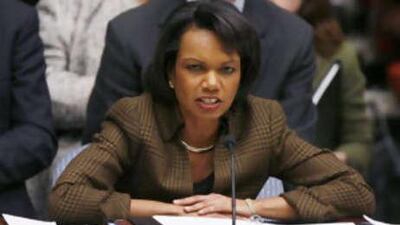NEW YORK // Condoleezza Rice, the US secretary of state, has pledged to lobby for a nuclear technology-sharing deal with the UAE despite opposition from legislators in Washington. The Government is due to finalise a so-called 123 agreement on atomic energy co-operation with the US, helping the Emirates to build nuclear power stations to supply energy to the country's rapidly growing cities.
But some legislators on Capitol Hill are seeking to delay the deal, claiming poor export controls in the UAE could see sensitive nuclear technology end up in the hands of Iran, the nation's biggest trading partner. Speaking at the UN headquarters on Tuesday, Ms Rice pledged she was "continuing to pursue the 123 agreement" despite the obstacles. "We are negotiating the UAE agreement because we believe that the UAE is a responsible state and has a responsible view towards its desire to pursue civil nuclear power," Ms Rice said.
"We, as you know, are proponents of civil nuclear power under the right conditions and obviously we would not negotiate an agreement that we believed was going to have any problem of leakage." Some analysts have warned of the spread of nuclear technology across the Middle East, with Iran allegedly seeking to build nuclear weapons rather than its purported claim of trying to harness atomic energy. The Government has said it would not engage in enrichment or reprocessing of nuclear fuel, and has engaged the International Atomic Energy Agency to strengthen safeguards. In April, the Government published a policy document outlining its intention to develop a peaceful, civilian nuclear energy programme that would focus on transparency, safety and non-proliferation. Ms Rice also signed a memorandum of understanding with the Government in April pledging to co-operate on a peaceful nuclear energy programme, under which the UAE promised to be a "responsible partner". Once enacted, the pact would allow for the transfer of nuclear-related technology and materials.
But Ileana Ros-Lehtinen, the senior Republican on the House Foreign Affairs Committee, introduced a bill last week outlining new conditions before the deal could take effect. Under Mrs Ros-Lehtinen's bill, the administration of Barack Obama would have to certify that the UAE is taking effective action to prevent any transfer of illicit materials to Iran and fully implementing UN Security Council sanctions against that country.
Mr Obama would also have to certify that the UAE "has developed and fully implemented an export control regime in accordance with international standards" and implemented a system "to target the logistical and financial networks that support terrorist organisations". Earlier this week Yousef al Otaiba, the UAE's ambassador to the US, said officials are "working closely with members of Congress to inform them about the agreement". "We are confident that the agreement highlights the transparency of the civilian nuclear energy programme the UAE is embarking on, and should be lauded as the gold standard of nuclear co-operation agreements," Mr al Otaiba told the state news agency WAM. "It is the view of the UAE Government that the proposed 123 agreement sets a new standard in ensuring the highest standards of safety, security and non-proliferation within the UAE programme." Sheikh Abdullah bin Zayed, the Minister of Foreign Affairs, spent the beginning of this week at UN headquarters with Ms Rice and other decision-makers discussing a range of issues including Iran's nuclear programme. Despite Ms Rice's assurance that the administration of George W Bush sought to finalise the co-operation pact, it remains unclear whether this will take place before Mr Obama assumes office on Jan 20. Ben Chang, a spokesman for the National Security Council, said on Monday the agreement was not expected to be signed this week, or even before the end of the year. Even once the agreement is signed, it must be formally submitted to Congress, triggering the start of a review period on Capitol Hill of 90 consecutive session days. It would automatically take effect at the end of that period, unless a joint resolution of disapproval is passed. jreinl@thenational.ae


